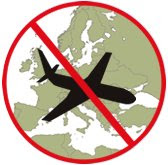Plaintiff had booked a flight from XRY (Jerez, Spain) to HHN (Hahn, Germany) for himself and his wife for Oct. 25, 2007 with
Ryan Air. Departure was scheduled 10:00 a.m.. Due to foggy conditions at XRY, the flight was cancelled. The aircraft landed in SVQ (Sevilla, Spain) and returned to HHN from there. Plaintiff and his wife were offered an alternative flight on Oct. 27 which they refused. They booked a flight from MAD (Madrid, Spain) to FFM (Frankfurt, Germany) for Oct. 25 instead.
Plaintiff sued for compensation of EUR 400 each under Art. 7 Reg. (EC) 261/2004 as well as additional costs of the flight MAD-FFM.
First instance court (Amtsgericht Simmern) dismissed the claim. Appellate court granted the claim to a large extent.
Upon appeal by Ryan Air,
German Supreme Court (BGH) dismissed the claim with regard to compensation under Art. 7 and repealed the judgement with regard to additional costs for procedural supplement.
In judgement Xa ZR 96/09 of March 25, 2010, BGH held that whether a cancellation reasonably could have been avoided had to be judged from case to case. Under the particular circumstances it had not been foreseeable how long the foggy conditions would last. Taking into regard the impact on the further flight schedule it would therefore not have been reasonable for Ryan Air to postpone the decision on cancellation.
Anyway, by offering alternative transportation not before Oct. 27, Ryan Air may have failed to comply with its obligation to provide adequate alternative transportation and may be liable for additional costs - which appellate court will have to consider in further proceedings .
Source: BGH press release 64/2010, available in German
here>>.


